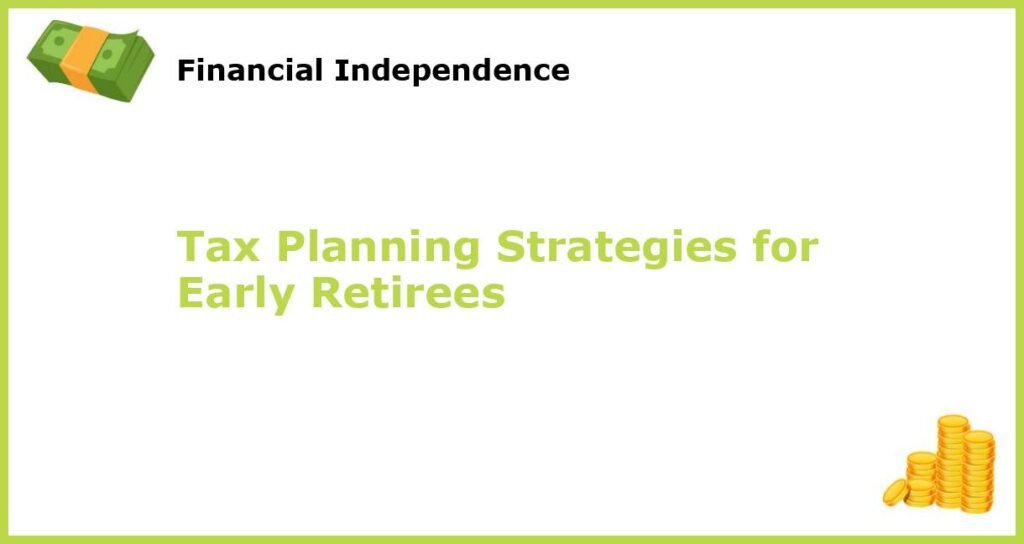Retiring early is a dream come true for many people. However, it’s important for early retirees to realize that they may be at risk of paying higher taxes if they don’t plan accordingly. This is why tax planning is crucial for early retirees so that they can minimize their tax burden and enjoy their retirement years without worrying about finances.
Maximizing Retirement Accounts

One of the best strategies for early retirees is to maximize their retirement accounts. Contributions made to a 401(k) or IRA reduce taxable income and allow money to grow tax-free until retirement age. By contributing the maximum amount allowed by law, early retirees can make the most of their retirement savings while reducing their tax burden.
Moreover, early retirees who delay taking distributions can defer taxes on those savings until they retire. Distributions from a traditional 401(k) and traditional IRA are subject to ordinary income tax. Therefore, retirees can wait until their taxable income is at or below the maximum limit of a tax bracket to withdraw money from their retirement accounts. This can significantly reduce their tax liability while allowing them to make the most of their retirement savings.
Utilizing the Roth IRA

The Roth IRA is another tax planning strategy that early retirees can take advantage of. This type of account allows contributions to be made with after-tax dollars. In other words, withdrawals in retirement are tax-free. This can be a great option for early retirees who expect to be in a higher tax bracket in retirement. Making Roth IRA contributions can also be helpful because unlike traditional IRA accounts or 401(k) accounts, there is no mandatory distribution age.
Donating to Charity

Early retirees who are charitably inclined may also benefit from donating to charity. Charitable contributions are tax-deductible, which means they can lower taxable income. Donating appreciated stock provides two tax benefits: donors can claim a tax deduction and avoid paying capital gains tax on the sale of the stock.
Another way to donate and save taxes at the same time is to gift money to charities through qualified charitable distributions (QCDs). QCDs enable taxpayers with traditional IRAs to donate up to $100,000 per year directly to charity after age 70.5. No taxes are due on the distribution, and the funds count towards the taxpayer’s required minimum distributions (RMDs).
Investing in Municipal Bonds

Municipal bonds are another tax planning strategy that early retirees may consider. Interest earned on municipal bonds is generally tax-free at the federal level. Additionally, if the bond is issued within the retiree’s state of residence, the interest received can also be tax-free at the state level. These tax benefits can provide a valuable source of income while minimizing tax liability.
Timing Retirement Account Withdrawals

An important component of tax planning for early retirees is to be strategic when withdrawing money from their retirement accounts. It may be beneficial to withdraw money in a year when their taxable income is lower to minimize taxes. Retirees can utilize tax planning strategies such as converting traditional IRAs to Roth IRAs in years with lower taxable income to avoid future required minimum distributions and reduce overall tax liability.
Using Tax Loss Harvesting
Tax Loss Harvesting is another tax planning strategy for early retirees. Retirees who have investments that have lost value can sell the asset to offset gains from other investments. This can minimize taxes while balancing an investment portfolio.
Managing Health Care Costs
Since health care expenses can be a significant portion of an early retiree’s budget, managing health care costs is crucial. Prevention is key, and early retirees should take advantage of preventative care to reduce medical expenses in retirement. Moreover, early retirees should explore options such as HSA accounts as a means to reduce the tax on health care expenses.
Assessing State Taxes
Early retirees should also be mindful of state taxes. Every state has different tax laws, and some states are more tax-friendly than others, so retirees may want to consider moving to a state with lower taxes to minimize tax liability and stretch retirement savings further. This can be a valuable tax planning strategy.
Working with a Financial Advisor
Finally, early retirees may want to consider working with a financial advisor to develop a comprehensive tax planning strategy. A financial advisor can provide invaluable advice and help retirees navigate complex tax laws. Additionally, a financial advisor can develop an individualized plan that aligns with the retiree’s unique goals, risk tolerance, and financial situation.







